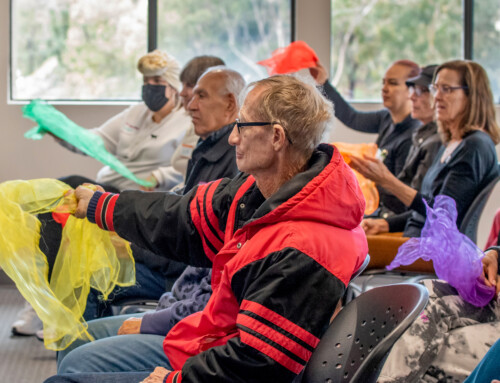
Welcome to part three of our four-part blog series on Intimacy & New Relationships, where our Director of Clinical Services, Sarina Barker, discusses the very real ways that loneliness and the lack of intimacy can adversely affect your life. Part 1 / Part 2 / Part 4.
A RECAP OF MY SECOND POST
Last week, we explored some of the ways you, the caregiver, may experience grief throughout your caregiver’s journey – in expected and unexpected ways. Now we will focus on how extended isolation and loneliness can create the desire to date again and to regain some normalcy and balance in your life. If you are reading this for the first time, I encourage you to check out the first two posts of this series (linked above), as each post builds off of the previous ones.
THIS WEEK’S TOPIC: HAVING HONEST CONVERSATIONS
Let’s talk about how to have honest conversations with family and friends about beginning a new romantic relationship. It’s reasonable to want to discuss your situation with important people in your life. Remember, however, that their outsider’s view of the reality of your situation may make it difficult for them to understand your very human need to be with someone who can provide companionship and can help end your isolation. It is possible to assume that everyone will have your best outcome in mind, but you should expect that some will not be able to understand, or appreciate, the idea of a new relationship. Finding the most appropriate way to communicate your needs will be essential to your own growth and ability to move forward.
RISKING ANOTHER LOSS
There are some risks associated with these open conversations with family and friends. Be aware that after sharing your innermost thoughts with those closest to you, they may not understand or agree with your decision. Disagreements can create a devastating emotional response, resulting in real loss caused by isolation from these important people. Our hope is that you can approach this topic with an open mind and willingness to adjust your own expectations. Each of us are responsible for our own selves and the best one can do is to be yourself and reflect back on those questions asked in our first blog on Understanding Yourself.
WHO TO TELL?
Deciding who to share your thoughts or decision with is a very personal choice. Only you can decide who needs to know, and who will support you in this next chapter. You may find yourself surprised by who is supportive and who isn’t. Friends may want to step in to protect your partner from pain or isolation. Adult children may feel that you don’t need companionship and intimacy right now as you have other priorities. It may also force them out of their comfort zone and to accept the reality of what is happening to their other parent. In both scenarios, it’s important to remember that each person is hurting in their own way. Keeping silent about your anticipated lifestyle may add significant stress and guilt. I encourage you to take some time to journal your thoughts, to talk to a close friend who knows your heart, or to consider discussing this in a support group.
MENTALLY PREPARING FOR THE CONVERSATION
First, I think it’s very important to prepare yourself for the wide range of responses that you may get. Because the topic is new to them but very familiar to you, choose to have a “First to Forgive” mind set. This will help you to keep an open mind and not take offense to negative responses from others. Remember, it may be very hard for others to understand the loneliness and isolation that has been a part of your life for a long time. Responding with love rather than anger will protect your relationship from taking their response personally. It’s not personal, they are grieving too. It will also allow you to show love and grace, even when others may not fully understand your own pain.
Next, look for the love in their response. Both you and the person you are speaking with love and cherish the same person. A difficult conversation does not mean it has to be ugly. It can be respectable, empathic, and genuine – regardless of whether you agree or disagree. Each person grieves differently. Don’t expect others to understand you and don’t try to convince them to agree with you. Remember, your intentions of having this conversation are not to seek their approval. You are seeking to connect, communicate openly and honestly, and reach a place of peace within yourself.
You are responsible for your own reactions, but you can’t control others. Owning your own peace and releasing responsibility for others’ acceptance of this decision gives you the freedom to agree or disagree without wavering in your need to feel loved again. You deserve to be happy and there is nothing selfish about that. Human beings were not meant to be alone. Reassure your family and friends that your love and care for your partner will not change because of this decision. If anything, it will uplift your spirits and make you more enjoyable to be around. You are not alone – you are among millions of other care partners who struggle with the same difficulty in hard conversations.
THE CONVERSATION
You know the person you are talking with best. What do they need to know? What do they already know about your feelings of isolation and loss? What are your reasons for sharing this with them?
There are a lot of different ways to start this conversation and I leave that up to you to decide what makes the most sense. The feedback I have to share with you is about the end of the conversation. Whether you agree or agree to disagree with this person, make sure to highlight your love and care for them. They were selected to hear these words from you because of your love and respect for the relationship. If this person needs reassurance that you will continue to provide the utmost care and support to your partner regardless of who you are dating, share that. If they need to know that your commitment to family will not change, share that. Only you can bring clarity and understanding to the conversation so be clear and be kind. Difficult conversations are not easy to have, but trust and respect are built in these small moments of transparency and openness. In the end, your goal is to have peace within yourself and the happiness you deserve.
NEXT – HOW TO TALK TO THE PERSON YOU WANT TO DATE
Next week we will explore how to have conversations with the person you want to date. The situation is unique and using some of the language we’ve talked about in understanding yourself and your own emotions will help to contribute to the success of that conversation.
Talk to one of our Clinical Care Coaches by calling us at 858.492.4400, and view our free services like education classes, support groups, social activities, and much more.
By Sarina Barker, MSW (Director of Clinical Services)





